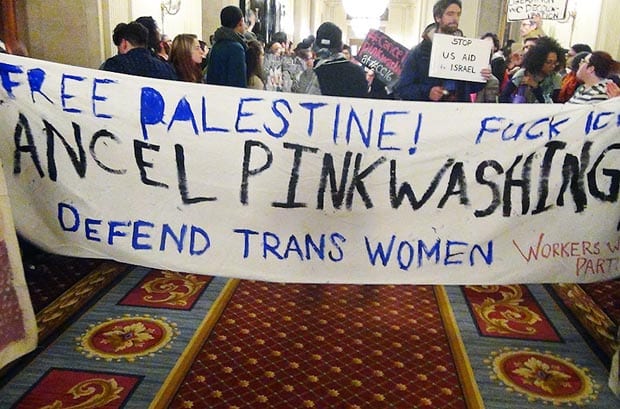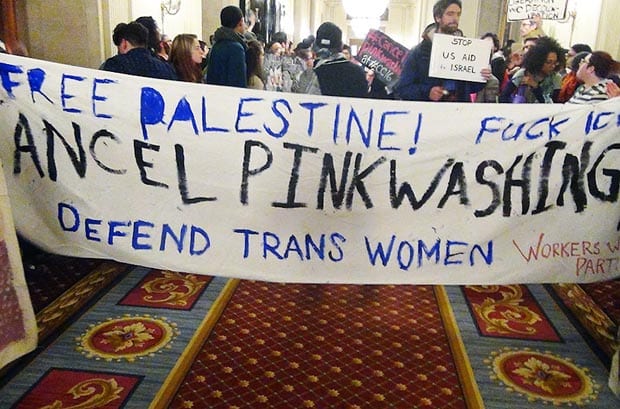Rather than carry on the tradition of open discussion among groups, Jewish groups were attacked at this year’s Creating Change

Creating Change attendees protested the presence of two Israelis from Jerusalem Open House and prevented them from holding a reception after Shabbat services. (Photo courtesy of A Wider Bridge)
DAVID TAFFET | Senior Staff Writer
taffet@dallasvoice.com
In the wake of controversy over protests outside a reception for Jewish groups at Creating Change in Chicago, a group of rabbis, pastors and LGBT leaders released a letter on Wednesday evening, Jan. 27, condemning events at the annual conference traditionally known as a place where ideas could be openly and respectfully debated.
“The events of Jan. 22 in Chicago were unacceptable and not in accord with the Task Force’s values of pluralism, inclusivity and thoughtful debate,” the letter said.
Among others, the letter was signed by Cathedral of Hope’s senior pastor, the Rev. Neil Cazares-Thomas, Equality Texas chair Steve Rudner, former Rep. Barney Frank, Metropolitan Community Church founder the Rev. Troy Perry and U.S. v. Windsor plaintiff Edie Windsor.
A Wider Bridge, a Jewish group based in San Francisco that promotes pluralism, had planned a Shabbat service on Friday night at Creating Change, with guests from Jerusalem Open House, an LGBT community center in Jerusalem. After three people complained about the appearance of Israelis at Creating Change because of Israel’s treatment of Palestinians, National LGBTQ Executive Director Rea Carey canceled the reception planned by A Wider Bridge.
But attacking Jerusalem Open House for the Palestinian issue in Israel is like blaming an interracial couple in Mississippi for discrimination. Israelis and Palestinians mix more freely at Jerusalem Open House than most other places in the country, according to Tom Canning, development director for Jerusalem Open House.
Protesters accused Israel of “pinkwashing,” the idea that the country promotes its respect for its LGBT community to cover up its deplorable treatment of Palestinians.
Where the planned reception had drawn complaints, its cancellation prompted protests from around the country.
Colorado Congressman Jared Polis tweeted, “There should be room for Israel’s premiere #LGBTQ advocacy group in our community.” And Robbie Kaplan, the attorney who argued U.S. v. Windsor before the U.S. Supreme Court tweeted, “Creating Change creates bias. As a Jew, Zionist & lesbian, I can no longer support NGLTF Very sad,” and later, “I don’t get it. @TheTaskForce keeps sending tweets today as if LGBT Jews were not censored yesterday in terror and fear. Not acceptable.”
The planned reception was then re-instated with what some described as a half-hearted apology from Carey.
“When faced with choices, we should move towards our core value of inclusion and opportunities for constructive dialogue and canceling the reception was a mistake,” Carey wrote. “In reversing the decision today, we want to make it quite clear that the Creating Change Conference will always be a safe space for inclusion and dialogue for people with often widely different views. It was not at all our intention to censor representatives of the Jerusalem Open House or A Wider Bridge at Creating Change and I apologize that our actions left people feeling silenced.”
But safe space wasn’t guaranteed when protesters disrupted the Shabbat service and reception. Jews trying to leave the were physically stopped by protesters.
The letter from rabbis and pastors described what happened: “The targeted organizations’ reception was disrupted and shut down by protesters (including people not attending the conference) with such hostility and aggression that speakers and attendees at the event were justifiably terrified and felt physically threatened.”
One witness said people were shoved, one man’s yarmulke fell to the ground, and others were blocked from leaving the reception while some escaped the room down a hallway through a back door.
“What transpired at CC16 was dangerous, deeply disturbing, and given the use of epithets like ‘kike,’ clearly anti-Semitic,” the religious leaders’ letter continued.
Creating Change, which has been held in Dallas twice, is traditionally a place where a diverse group of LGBT activists have a dialogue on every issue affecting the LGBT community. While attendees don’t necessarily leave agreeing with one another, new alliances do form at the conference and many take away a new understanding of others in the LGBT community.
But A Wider Bridge and Jerusalem Open House never got the opportunity at the conference to explain the work they do.
Rabbi Eleanor Steinman, an educator serving the Los Angeles area, is a former board member of A Wider Bridge. She said the organization’s main goal is to connect the American and Israeli LGBT communities.
Many American LGBT organizations have Israeli counterparts. Like many American cities, Jerusalem and Tel Aviv have community centers. Ma’arivim (which means “evening prayers”) empowers members of the trans community. P-FLAG, the support group for parents, family and friends, has chapters throughout Israel as well. And A
Wider Bridge connects Israel’s LGBT youth groups with American LGBT youth groups.
A Wider Bridge organizes trips for American LGBT activists to meet activists in Israel and the West Bank. Steinman said while other Israeli trips are available, trans men and women especially appreciate going to Israel with A Wider Bridge because they can be comfortable traveling with other trans people and will meet trans Israelis.
She addressed the idea of “pinkwashing” by calling it “the claim perpetuated by the radical left to the detriment of the LGBT community.”
Most of all, Creating Change is traditionally a place for discussion between groups that don’t see eye-to-eye. But when those on one side of an issue shut down those on the other without any discussion, Steinman said, that’s equivalent to what happened during the AIDS crisis when ACT-UP warned, “Silence equals death.”
A Wider Bridge Founder and Executive Director Arthur Slepian said that in addition to connecting people from Jerusalem Open House with activists in the U.S., there was a deeper reason to bring them this year — last summer at Jerusalem Pride, there was a stabbing and murder.
“Their community has been through trauma,” Slepian said. “We thought they’d be embraced. Instead, they were part of the firestorm.”
He said what happened to his group was part of what appears to be a “new ethos” at Creating Change. “It’s OK to shut down voices you disagree with,” he said.
Slepian added that groups that demand “safe space” are the first to take safe space away from those they disagree with, and he called Carey’s statement since the conference to be a good first step.
“She talks about people being encouraged to bring their whole selves to Creating Change,” he said. “I don’t know that anyone who identifies with Israel ever felt comfortable bringing their whole selves.”
This article appeared in the Dallas Voice print edition January 29, 2016.














